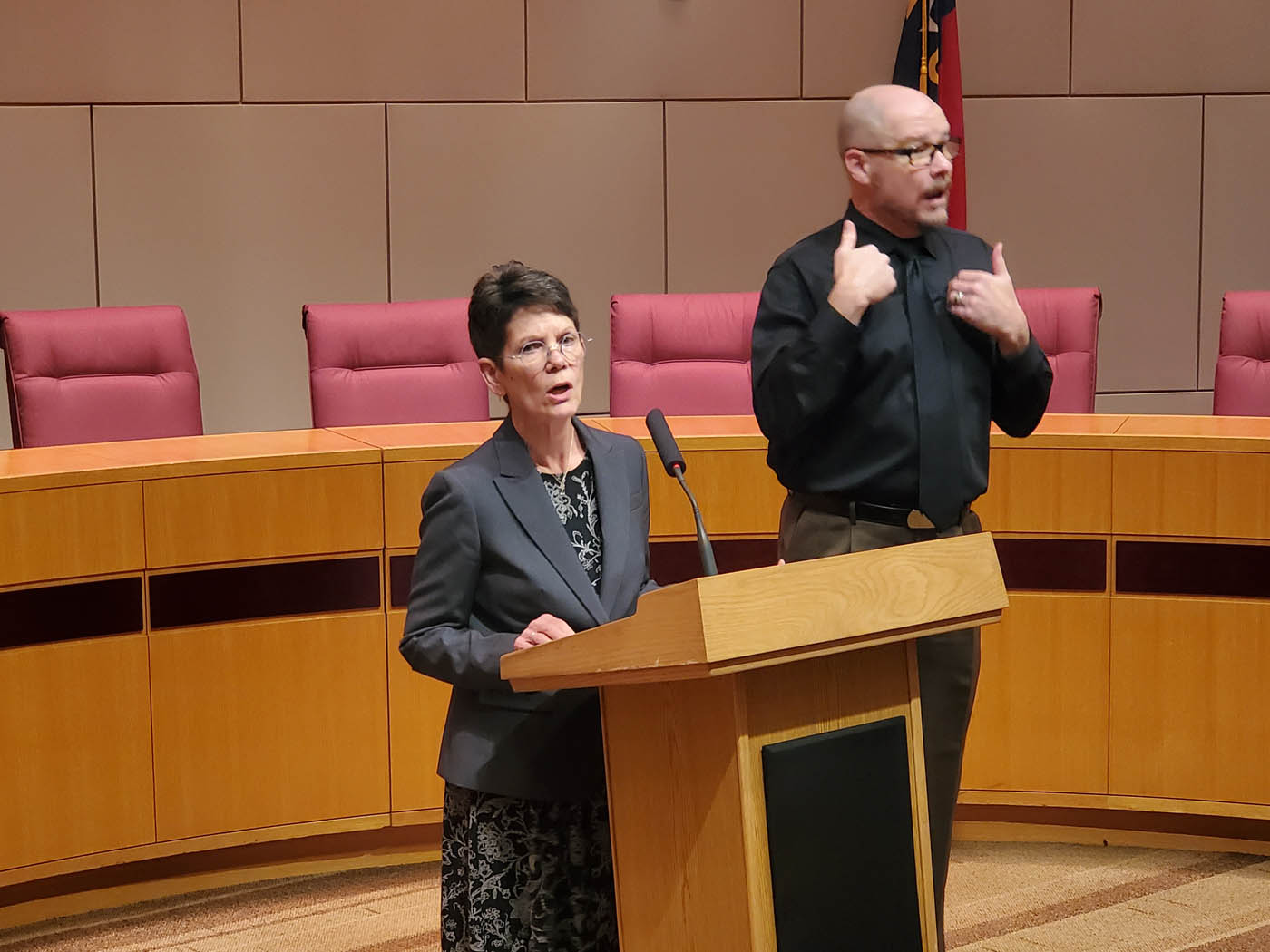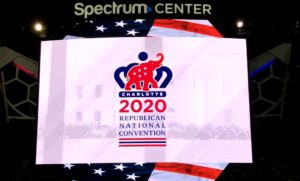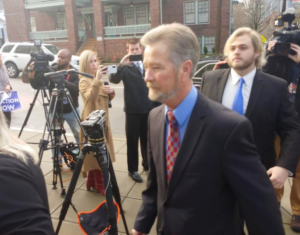Can Charlotte Cancel The RNC Over Coronavirus? And Will We See A Surge In Mail Voting?

CREDIT: STEVE HARRISON/WFAE
Will the coronavirus derail the Republican National Convention in August?
And what about its impact on the general election? Will North Carolina shift more to voting by mail, even after the General Assembly last year eliminated the role of third parties in helping voters request mail ballots?
And how have other national emergencies – like the 1918 Spanish flu pandemic – impacted our elections?
The “Inside Politics: The RNC in Charlotte” podcast will explore these questions this week.
First off is the RNC and whether the Charlotte will still host.
As of today, the RNC is still on. But if nothing changes, it can’t take place. North Carolina Gov. Roy Cooper issued an executive order last week that prohibited gatherings of more than 100 people.
And on Monday, Mecklenburg Health Director Gibbie Harris went further, banning gatherings of more than 50 people. And Harris on Tuesday said it’s possible that Mecklenburg could enact a “shelter in place” requirement as San Francisco has done.
“I think we may be moving in that direction more quickly than we would be like,” she told Mecklenburg Commissioner Mark Jerrell. “What we’re trying to do in the county is to prevent us from getting to the place where a San Francisco or a New York has found themselves.”
But what happens if the spread of the virus subsides and North Carolina and the nation are able to “flatten the curve?”
What would happen if President Trump says he wants to come to Charlotte and have the RNC as usual?
Would the Charlotte City Council be OK with that?
It turns out that it doesn’t really matter. Council members can’t get out of hosting because of the coronavirus.
In the city’s contract with the local host committee and the Republican National Committee, there is no wiggle room. The only escape clause for the city is if the federal government doesn’t give the city the expected $50 million federal security grant.
“That’s the gist,” said city attorney Patrick Baker. “And unless the parties had some mutual agreement, neither party can just walk out.”
The city’s contract with the RNC also doesn’t have what’s known as a Force Majeure provision. That provision allows for one party to opt out in case of an “act of God” — an event like a natural disaster, a hurricane or a pandemic.
And that means the city is essentially powerless to get out of hosting because of the coronavirus.
“Yeah that’s going to be a conversation that we’ll have to have at that time,” Baker said. “If you are in that gray area of you can host, but should you host the convention? Which is where we were a few weeks ago. But that’s something we’ll have to consider as we go.”
Baker added: “It wouldn’t be a City Council decision.”
Both the Charlotte host committee for the RNC and national Republicans won’t speculate on what might happen this summer. The host committee says it’s coordinating with stakeholders and taking necessary precautions.

And a spokesperson for the president’s reelection efforts – Trump Victory – says the administration has shown “incredible leadership” and that they are “taking unprecedented actions” but that it is “business as usual.”
The RNC is planning a media walk-through April 12 at the Spectrum Center.
And it’s unclear how the president will view the virus over the summer, if the nation is able to flatten the curve.
Will he see it as a continuing threat, like when he recommended Americans not gather in groups larger than 10 people?
Or will he return to his tone in early March, when he spoke at a rally at Bojangles’ Coliseum and compared the coronavirus to the seasonal flu?
“Inside Politics” reached out to the Republican National Committee about whether they have a provision that would allow delegates to nominate President Trump remotely or virtually. The RNC didn’t respond.
Can The President Move The Date Of The General Election Because Of The Virus?
There were supposed to be eight primaries on Tuesday — Louisiana, Georgia, Ohio, Kentucky, Maryland, Illinois, Florida and Arizona.
And in the end, only three states voted.
States can easily move their primaries. But the date of the general election is set by federal law – the first Tuesday after the first Monday in November.
It can be changed, but Congress would have to pass a law, which would be signed by the president.
And with Democrats controlling the House of Representatives, any effort to move the date of the general election would need buy-in from both parties.
Is There A Chance That North Carolina And Other States Might Use More Mail Voting?
North Carolina Board of Elections director Karen Brinson Bell said she is — for now — preparing for a May 12 runoff election for Republican Mark Meadows’ seat in the 11th Congressional District.
She said her office may ask the General Assembly for more flexibility in upcoming elections, including the November general.
“We have to consider what does in-person voting look like?” she said. “And how would we conduct that?”
One of her earliest concerns is staffing precincts with poll workers.
“Our average age of our poll workers is about 72,” she said. “And that puts them into a high-risk category.”
She said she’s thinking about small changes like having disposable pens at polling places for people to sign the poll book.
Brinson-Bell is also considering having to handle much more voting by mail– or, in a worst-case scenario, having an all-mail voting election.
“I think we have to get a sense of is this a short-term epidemic?” she said. “Or is it something that follows more of the flu schedule? So we’re listening to our health care officials, to the executive orders and state of emergency language that’s shared with us. We’re working with our partners.”
She also said that mailing ballots to every registered voter would require a change in law.
“I think that we just have to consider is what does our law allow?” she said. “Would we need to take legislative changes? And that shift in many of those states, what they do is mail to every registered voter a ballot without request. So that’s a change in our law.”
How Did The 9th District Mail Ballot Scandal Impact Mail Voting In North Carolina?
North Carolina law today says anyone can vote absentee mail by mail with no excuse needed. But a voter has to request an absentee ballot.
Other states – like Washington – send mail ballots to all registered voters.
In the 2018 9th Congressional District scandal, political operatives in Bladen County were encouraging people to request mail ballots and then collecting those request forms. At the time, that was legal.

But those same operatives were then coming back and collecting the completed ballots, which was illegal.
After the scandal, the General Assembly – in a bipartisan vote – changed the law to say that third parties can’t collect or “harvest” ballot request forms. That was designed to eliminate political operatives from being involved at all in the mail-ballot process.
And that means that we could have an election where tens of thousands of more people want to vote by mail, but it’s now harder to do so.
Attorney Marc Elias, who represented Dan McCready in the 2019 State Board of Elections hearing, said that the law against collecting ballot request forms discriminates against low-income and minority voters.
He has filed a lawsuit trying to overturn the new law. (It was filed before anyone thought about the coronavirus’ impact on an election.)
Brinson-Bell said she doesn’t know how much all-mail voting would cost.
“We would have to coordinate that with those companies that do the printing for the counties,” she said. “And what that cost would look like. And (we’d have to have) consideration with our legislative leaders about is prepaid postage something that they would want to consider. So, not saying that’s the route we need to go, but those are the kind of numbers that we’ll be pulling together.”
What About Other Elections In Times Of Crisis?
Matt Dallek is a political historian from George Washington University who studies the intersection of social crises and political transformation.
He said there isn’t one good analogy to the 2020 coronavirus outbreak, but history “does sometimes have echoes or rhymes.”
The most obvious parallel is 1918, when the Spanish flu took hold. It killed an estimated 675,000 people in the U.S.
Its peak fell in October, just before the midterm election.
“The Spanish flu did curtail a lot of political activities that year,” Dallek said. “Politicians stopped holding some rallies. There were no longer at torchlight parades. Voters sometimes were told to wear masks when they came out to vote.”
But people did show up at the polls. By election day, the flu was subsiding, and less than a week after Election Day, World War I ended.
Turnout was about 40%, down from 50% turnout in the previous midterm in 1914.
Dallek said it’s hard to tell whether flu was to blame since turnout continued to fall in the following two midterms.
As far as political conventions, there was the 1860 Democratic National Convention – or conventions – which broke down over slavery. The first convention in Charleston, South Carolina, failed to come up with a nominee. There was a second convention two months later in Baltimore, when the Southern states ended up leaving the convention and nominating their own candidate.
And four years later, while the war was still on, Abraham Lincoln made the decision to furlough Union soldiers so they could go back home and vote in the general election.
And in recent memory, there was 9/11. That fell on a primary day in New York, which included a mayoral primary in New York City. All the votes cast that morning didn’t count.
“And so it really had a disruptive effect,” Dallek said. “But I think it’s also a good example because we see the ways in which election officials and elections, they’re certainly imperfect, they can be deeply flawed, but they also can be resilient, right, where people can ultimately have some confidence in what occurred and the elections were held a couple of weeks later.”
Click here to subscribe to the Inside Politics podcast (and to give the podcast a rating/review in your favorite podcast app).
Want more? You can sign up here for our weekly Inside Politics newsletter, written by Steve Harrison.
Have a question about the 2020 RNC in Charlotte? Ask us below.